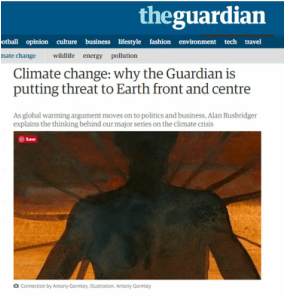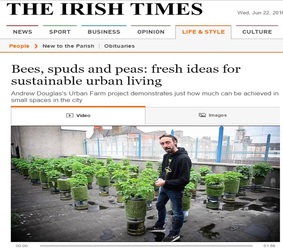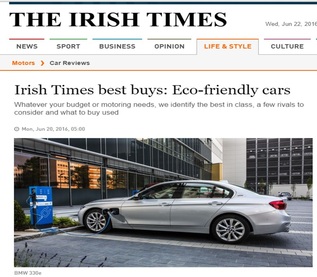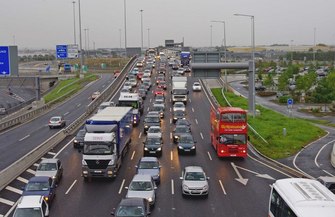| Just before Alan Rusbridger retired as Editor of the Guardian newspaper in March 2015, he wrote an editorial saying his only regret was not giving climate change the attention it deserved. He explained: 'We prefer to deal with what has happened, not what lies ahead. We favour what is exceptional and in full view over what is ordinary and hidden'. Subsequently, the Guardian has covered climate almost daily, giving climate change the front-page at least once a week. Rusbridger's regret is a problem with climate coverage in the media worldwide. Climate is the biggest challenge facing humanity and solving it means changing everything about the way we live within the next three decades, but it rarely gets a mention in mainstream press relative to its significance. |
Where Irish Times gets it right
It’s refreshing to see an Irish news source taking its obligation to prepare the public for the inevitable changes ahead, and I hope more of Ireland's media sources will follow their lead as the world begins its low-carbon transition in line with the U.N. Climate Agreement. |
Where Irish Times got it wrong
| The Irish Times article argued the Volkswagen diesel scandal was over nitrogen oxide, which they claimed “does not contribute to climate change”. This is scientifically incorrect. Oxides of nitrogen (NOx) contribute indirectly to climate change by increasing formation of ozone (a greenhouse gas) and methane (which has 28 times more global warming potential than carbon dioxide). One can hardly call a vehicle produced by a company that knowingly damaged the health of people around the world, in addition to taking a toll on our already fragile climate, “eco-friendly”. A more accurate analysis of eco-friendly cars would have to be limited to fully electric options or maybe hydrogen fueled cars (if they existed) because that is the technological transition we have to make if we really want to prevent climate change from reaching unbearable limits. |
We're getting it all wrong on cars...
| But it's not just the Irish Times that got it wrong on cars and transport. When Harry McGee interviewed climate change Minister Dennis Naughten this week, Minister Naughten seemed to think that the only solution to reducing greenhouse gas emissions from the transport sector was to wait until we could replace all petrol vehicles with electric ones. There was no mention of improving public transport or cycling infrastructure. Our government seems to think "transport" means cars and roads and nothing in between. |
Last May, Ireland's EPA reported:
“Transport emissions are projected to show strong growth over the period to 2020 with a 13%-19% increase on current levels depending on the level of policy implementation."
| The government's ignorance on transport isn't just limited to national politics... This week, Kilkenny Council announced it was shutting down its only public city bus as it continues to fund road development. In speaking to Kilkenny County Councillor Malcolm Noonan (Green Party) about this turn of events, he said: |
The existing bus service operator and I mapped three routes that would take in all major employers, the Watershed, schools and residential areas. I spoke to a utility company and other possible partners to develop an electric three shuttle bus service, subsidised from on street parking charges and the State. Effectively, we handed a proposal for a service to the Council on a plate and nothing happened.
Now, we have a short window of time to drastically reduce emissions from transport, but more importantly, create a healthy people centered City where the private car is not king. It's all about priorities and we have gotten ours badly wrong... At a time when Local Authorities across the world are investing in public transport, cycling and walking to improve urban air quality and overall health, we are investing almost 17m in a road and bridge that are not connected to anything and will make traffic problems in the City worse.”
But there's nothing stopping us from getting it right!
| Dublin Cycling Campaign has already demonstrated how such efforts can be wildly successful when they worked with NTA to build the outstanding cycle path along the Grand Canal. Dublin sacrificed 200 car parking spaces for that path, but now we're seeing people who would have never felt safe cycling before using the path as part of their daily commute. We need to increase public cycling in our nation's capital from its paltry 5% to the levels we see in places like Copenhagen of 35-45%, but to do that we need cycle paths that we'd feel safe enough to let our kids ride on. Aside from addressing climate change, there are a lot of other reasons to move from a car-dominated society to a cycling and public transport dominated one. To name a few: | Grand Canal cycle path, Dublin. Credit: Eamon Ryan |
- Revitalized town centers - Those who use public transport/cycling are far more likely to spend money on their commute than those in cars. Dublin businesses have already said they're losing money because congestion has gotten so bad and many of our towns' high streets are crumbling as shoppers move out to retail estates with plentiful parking. We need to get those shoppers out of their cars if we want them back.
- Reduced obesity and mental health issues - Those who walk/cycle are far less likely to suffer from such problems. We have a mental illness crisis in this country and we're on our way to becoming the fattest nation in Europe by 2030, so now might be a good time to hop on the bike or put on the walking shoes.
- Reconnection of communities - Pope Francis said in his recent Encyclical that public transport connects us while cars isolate us. Amen! (But he forgot to mention that there's WiFi on our buses and trains now so we don't need to talk to each other.)
- Improved air quality - Ireland has some of the highest asthma rates in the world and vehicle emissions are a major contributor to respiratory illness.
- Improved road safety - Less road fatalities occur when a transport system is dominated by public transport and cycling
- Less road congestion - This creates more optimum conditions for heavy goods vehicles and trade.
- Quieter streets! - A passing car generates far more noise than a wind turbine, so why don't we complain more about vehicle noise?







 RSS Feed
RSS Feed
